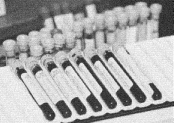

|
Get out that mosquito repellent |

Dr. Robert Desowitz |
Anyone looking for career inspiration may find "a bright and brilliant future" in malaria research, says Dr. Robert Desowitz, a world expert on tropical diseases.
That's because cases of malaria are rising steadily in the Third World and there are no effective controls or treatments to keep the disease in check. If current trends continue, malaria may also make its presence felt in the developed world, claims the professor emeritus of tropical medicine and medical microbiology, at the University of Hawaii. Desowitz was on campus last week to deliver the annual Strickland Memorial Lecture in biological sciences.
He said researchers studying the disease today almost invariably recite the same ominous "statistical mantra."
"There are three billion people at risk, and 300 million infected, and of these, it's estimated three million will die each year. We've come to a state now of dilemma, where malaria is less treatable, and there are virtually no good drugs, and no insecticides."

|
One of the main reasons for this latest re-emergence is certain species of mosquitoes, which carry the malaria parasite, have become resistant to the insecticide DDT, and nothing comparable (and environmentally safe) has been developed to replace it. Scientists have been trying to find a vaccine for malaria since 1910, he says, but have poured billions of dollars into the effort since 1972, mainly because of the loss of insecticide control. Despite the huge investment, however, a vaccine does not appear to be on the horizon. There are a few preventative or chemo-prophylactic drugs available which work in the short term, such as Lariam or Methloquine, but they have some disturbing side effects.
Much of Desowitz's lecture focused on the history of malaria, since it has had a more profound influence on "shaping the human genome" than perhaps any other factor, he says, accounting for racial differences in blood composition.
"There have arisen a whole bunch of essential characteristics in our blood that have been brought about by the pressure of selection that the malaria parasite has exerted...the West African black, for example, became completely resistant to infection with one type of malaria." Desowitz speculates this resistance may have influenced the course of slavery, since West Africans were able to work in agricultural areas where no one else was.
The point of Desowitz's historical survey, however, was to provide a "vision that there seem to be no permanent solutions, that all of us are in danger, particularly with changing climate," since it's clear that "as the ice climbs up and goes north, so the mosquitoes will follow."
Yet while Desowitz paints a rather bleak picture of malaria's ability to survive changing conditions, he is no pessimist. He says there is some "very wonderful work" going on in biological control, some of it right here at the University of Alberta, and the search for a vaccine must continue.
![[Folio]](http://www.ualberta.ca/~publicas/folio/gif/small/folio.gif)
Folio front page |
![[Office of Public Affairs]](http://www.ualberta.ca/~publicas/gif/small/opahome.gif)
Office of Public Affairs |
![[University of Alberta]](http://www.ualberta.ca/~publicas/gif/small/uahome.gif)
University of Alberta |